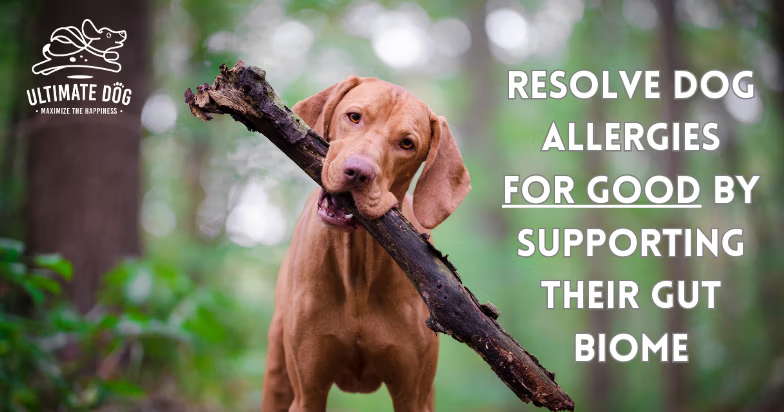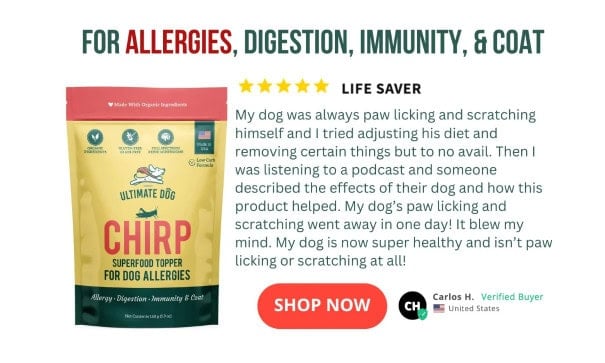From pricey, hard-to-get medication to bank-breaking specialty diets, there are a lot of ways to deal with dog allergies these days. But what if I told you the only way to truly help your dog overcome allergy symptoms is by supporting a healthy gut biome? The best part is this can be done naturally without medication or high-priced veterinary diets.
As researchers continue to unravel the mysteries of the microorganisms living in the gut, they’re finding more evidence that links gut health with immune system function. For dogs living with debilitating food or environmental allergies, this means that relief will come not by treating topical symptoms, but by rebalancing the trillions of single-cell organisms living inside them.
Below, we’ll look at what allergies are and how they develop, what the gut biome is and how it’s connected to the immune system, and six simple, inexpensive things you can do to improve dog gut health to end allergy suffering once and for all.
What Are Allergies?
If you’re reading this, then you already know what allergies can do. But do you know the physiological process that triggers them?
Allergic reactions in dogs occur when the immune system reacts to a non-threatening protein, such as food or pollen, as if it were a dangerous pathogen. Mast cells in your dog’s gut and on their skin sense the presence of this protein and send out chemical signals that cause inflammation. This inflammation and how the body reacts to it are responsible for the itching, swelling, digestive upset, and discomfort that come with canine allergies.
A healthy immune system will not react this way to benign proteins naturally found in the environment. But an immune system that is out of balance becomes hyper-reactive. This reactivity doesn’t just affect foreign proteins, either. Often, dogs with allergies also develop autoimmune issues caused by their immune system attacking their own cells.
What Is the Gut Biome?
The gut microbiome is a collection of trillions of microorganisms that live inside your dog’s (and your own) intestines. A healthy dog gut biome consists mostly of symbiotic, or beneficial, single-celled organisms that work with the body to improve health. When this balance gets thrown out of whack, harmful pathogens begin to take over, causing inflammation, disease, and immune system imbalance.
The health of the canine microbiome is affected by food, drugs, stress, and more. Unfortunately, many of the common treatments for allergy symptoms inadvertently harm the beneficial bacteria in the gut. Allergy medications, including antihistamines and anti-inflammatories, have been shown to negatively affect common beneficial bacteria strains. And almost all commercial hypoallergenic foods contain high levels of starch, which is known to cause gut imbalance in dogs. Even relatively benign allergy treatments, such as topical medications and frequent bathing, can cause problems in the microbiome on the skin, which, in turn, causes problems in the gut.
The Gut Biome-Allergy Connection
When the canine gut microbiome is thrown out of whack, it causes a host of problems, from behavioral changes to digestive upset. But one of the most affected systems is the immune system. About 90% of your dog’s immune system exists in their gut in the form of probiotics that aid in immune system development in young dogs, neutralize pathogens, regulate inflammation, and more.
Immune System Development and Regulation
In puppies and young dogs, the microbiome is key to training and shaping the immune system. Not only do these microbes play a role in training T-cells to distinguish between harmful and harmless proteins, but they actually help determine how many of each type of immune cell is created and how reactive they are to pathogens. Once the immune system has matured, the gut biome helps regulate immune cell numbers and reactivity through chemical communication between the gut, the brain, and key immune system organs.
Puppies who experience gut biome imbalance are far more likely to experience allergy problems and autoimmune issues as adults.
Production of Antimicrobial Substances
Many of the microbiotics in the gut exist as the first line of defense against pathogens that enter the digestive tract. Some of these organisms feed directly on pathogens, while others produce antimicrobial compounds, such as short-chain fatty acids, antimicrobial peptides, and bacteriocins, that kill bacteria, viruses, and fungi.
When there aren’t enough probiotics in the gut to target pathogens, these harmful organisms take over, further throwing the body out of balance. This leads to inflammation that directly and indirectly increases allergy symptoms.
Regulation of Inflammation
Beneficial bacteria in the dog microbiome influence the immune system’s response to inflammation. When there aren’t enough good bacteria or too many bad bacteria, immune cells over-respond to inflammation, making it worse. This causes low-grade inflammation that persists throughout the body, even in the absence of pathogen activity.
Because inflammation breeds more inflammation, this state increases the likelihood of allergic response to benign proteins, leading to the development of new allergies and worsening allergy symptoms. It is also likely to lead to the development of autoimmune diseases.
Hormone Production
Hormones are part of the communication pathway of the endocrine system, which regulates growth and metabolism. Immune cells also contain receptors that react to hormone signaling, and the activity of adaptive and innate immune cells is affected by hormones. Interestingly, the gut microbiome has been found to produce hormones, including serotonin and dopamine. These microbes also respond to hormones produced by the body.
While still not well understood, it is believed that this cross-talk between the gut biome, endocrine system, and immune system plays a key role in immune health and allergy symptoms. An increase in allergy problems paired with a change in behavior may indicate an imbalance in gut-produced hormones.
Intestinal Barrier Function
One of the most important jobs the gut microbiome performs in terms of preventing allergies is creating a barrier in the intestines. The organisms of the biome and the substances they produce help strengthen tight junctions between intestinal epithelial cells. When gaps form between these cells, pathogens, food particles, and toxins can make their way into the bloodstream. Known as “leaky gut” syndrome, this problem causes inflammation throughout the body.
When foreign protein particles make their way into the bloodstream like this, the immune system responds by attacking them. This creates antibodies to that protein that can cause future reactions when that protein is encountered in the gut and on the skin. In this way, leaky gut syndrome is responsible for many allergy problems dogs suffer.
Immune Tolerance and Allergies
By aiding in immune system development and regulation, proper inflammation response, and strengthening the intestinal barrier, the gut biome helps prevent immune reactions to harmless substances. The more diverse and balanced the microbiome, the more effective it is in these tasks. Indeed, studies into allergy symptoms in dogs and humans have shown that those suffering from allergies are more likely to have low variation in microorganisms, low numbers of beneficial bacteria, and high numbers of harmful bacteria in their gut.
How to Support Gut Health to Beat Dog Allergies
Given how sensitive the gut biome is to stressors, medications, and food composition, it’s no wonder our dogs suffer from allergy issues. Luckily, there are many things you can do to help strengthen your dog’s biome, repair leaky gut issues, and balance their immune system to reduce allergy symptoms and prevent new allergies from developing.
Feed a Biologically Appropriate Diet
The bacteria living in the gut feed off the food their host eats. Interestingly, studies have shown that the types of bacteria associated with low allergy symptoms in humans are different from those associated with the same in dogs. And that makes sense, considering we evolved eating very different diets than our canine companions.
A healthy, balanced biome in dogs is achieved by feeding a diet that is high in meat, fat, and animal-sourced prebiotics like chitin. When dogs eat too much starch, the number of carbohydrate-hungry bacteria in their intestines increases, leading to inflammation and imbalance. Starches from grains are especially bad because they contain lectins, which are known canine digestive tract irritants.
Most commercial dog foods, especially kibble and hypoallergenic diets, are made with high proportions of carbohydrates. And many contain chemical preservatives, dyes, and pesticides that also negatively impact the gut biome. By switching your dog to a homemade raw diet or a high-quality commercial raw or freeze-dried diet, you can avoid many of the factors that contribute to gut imbalance.
Avoid Antibiotics
Antibiotics are made to target bacteria and other single-celled pathogens that cause the body harm. Unfortunately, most do not discriminate and will kill beneficial microbes just as easily as harmful ones. When your dog takes antibiotics, much of the flora in their gut is wiped out. This allows bad bacteria to take over, especially if antibiotic-resistant strains are present. It also creates the perfect environment for leaky gut syndrome to begin.
Unfortunately, not giving your dog antibiotics isn’t enough to avoid issues. Most dog food contains meat that was raised with antibiotic-rich feed. That means those dangerous, probiotic-destroying chemicals are still getting into your dog’s system. The best way to avoid this is to feed only organic meat and eggs and wild-caught fish.
Avoid Allergy Medications and Other Drugs
Unfortunately, antibiotics aren’t the only drugs that have been found to negatively affect the bacteria in your gut. Many popular antihistamines used to control allergy symptoms in dogs are also very bad for the gut biome. The same is true of steroids and anti-inflammatories often used for topical allergy symptoms and environmental allergies. In fact, about 25% of the varied drugs tested in one research study were found to reduce the number of at least one common bacteria strain found in the body.
Instead of relying on allergy drugs for your dog’s allergy relief, try some of our natural remedies for dog allergies. Once they’re off the drugs, you can utilize our pointers here to repair their gut biome to find lasting allergy relief.
Avoid Over-Vaccination
While research into the interactions between vaccinations and gut biomes is lacking, the studies that do exist highlight the clear potential for vaccines to alter the makeup of microbiomes within the body. Additionally, many animal vaccines include preservatives, and sometimes even heavy metals, that are known to negatively impact gut health. Until the interactions between vaccines and the gut biome are better understood, it is a good idea to avoid unnecessary vaccines for your dog and opt for titer tests rather than booster shots when possible.
It is also worth noting that the effectiveness of vaccines is highly dependent on the health of the gut microbiome. Many studies have shown that subjects with unhealthy biomes have limited responses to vaccines. By taking steps to support the health of your dog’s biome, you can ensure the vaccines they do receive are more effective, which will reduce their need for repeat vaccinations.
Reduce Stress
Stress is another major factor in the breakdown of the canine microbiome. Whether it be separation anxiety, boredom, or fear issues, stress can take a toll on dogs the same way it can on humans. If your dog suffers from anxiety, take steps to reduce it by increasing their activity and avoiding problematic triggers like being home alone or other stressful situations.
Because the microbiome is partially responsible for creating the hormones that help us deal with stress, being out of balance can have a compounding effect on these issues. By working to balance your dog’s biome while reducing their stress, you can double your impact to help them find relief from allergies and anxiety sooner.
Feed Prebiotics, Probiotics, and Digestive Enzymes
Feeding a high-quality, biologically appropriate diet and reducing exposure to antibiotics, medication, and stress will help reduce damage to your dog’s gut biome. But if you want to speed up their recovery to get fast relief from dog allergy symptoms, you need to do more.
A quality dog probiotic that includes animal-based prebiotics and digestive enzymes can help speed their recovery. These kinds of supplements provide the right food to support the beneficial bacteria in the gut while adding more strains to help diversify the biome for better balance and protection. At the same time, digestive enzymes help your dog break down nutrients for better absorption. This helps with overall health while allowing the gut lining time to heal to reverse leaky gut problems.
Defeat Dog Allergies for Good
Whether your pup is dealing with food allergies or environmental allergies, the path to recovery starts in the gut. The trillions of microorganisms that thrive there play a valuable role in the health and effectiveness of the immune system. When they get thrown out of balance, your dog’s immune system becomes overactive, leading to allergy symptoms, chronic inflammation, and autoimmune disease.
The cells of the intestinal lining are replaced every 2 to 4 weeks, more often than any other surface cells in the body. But when severe inflammation and imbalances are present, it can take months or even years for the gut to fully heal. There is no quick fix to reversing gut damage and imbalance. But there are steps you can take to help support this process, including providing a quality diet, avoiding antibiotics and unnecessary medications, and supplementing with an effective dog probiotic supplement.
By supporting your dog’s gut biome, you can help put an end to allergy symptoms and prevent new allergies from forming.
Sources
Cintio, M., Scarsella, E., Sgorlon, S., Sandri, M., & Stefanon, B. (2020). Gut Microbiome of Healthy and Arthritic Dogs. Veterinary Sciences, 7(3), 92.
Guo J, Tang J, Kang T, Xiong Y, Xiang Z, Qin C (2020) Different immunization methods lead to altered gut flora and varied responses to Mycobacterium tuberculosis infection in mice. J Infect Dev Ctries 14:1170–1177.
Rizzetto, L., Fava, F., Tuohy, K., & Selmi, C. (2018). Connecting the immune system, systemic chronic inflammation and the gut microbiome: The role of sex. Journal of Autoimmunity, 92, 12–34.
Rostaher, A., Morsy, Y., Favrot, C., Unterer, S., Schnyder, M., Scharl, M., & Fischer, N. M. (2022). Comparison of the Gut Microbiome between Atopic and Healthy Dogs—Preliminary Data. Animals, 12(18), 2377.
Sinkko, H., Lehtimäki, J., Lohi, H., Ruokolainen, L., & Hielm-Björkman, A. (2023). Distinct healthy and atopic canine gut microbiota is influenced by diet and antibiotics. Royal Society Open Science, 10(4).
Stelzer, I. A., & Arck, P. C. (2016). Immunity and the Endocrine System. In Elsevier eBooks (pp. 73–85).
Stewart, A. S., Pratt-Phillips, S., & Gonzalez, L. M. (2017). Alterations in Intestinal Permeability: The Role of the “Leaky Gut” in Health and Disease. Journal of Equine Veterinary Science, 52, 10–22.
Zimmermann, P. The immunological interplay between vaccination and the intestinal microbiota. npj Vaccines 8, 24 (2023).

Sara Seitz worked in the pet industry for over a decade. In addition to being a certified dog trainer, Sara gained experience working as the general manager of a dog daycare and boarding facility, as the creator and manager of a pet sitting company, as a groomer, and as a dog behavior evaluator. She also has a bachelors in animal behavior from CSU. Currently, Sara works as a freelance writer specializing in blog, article and content writing.




Leave a Comment